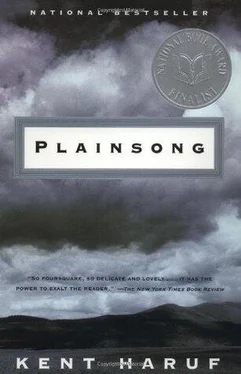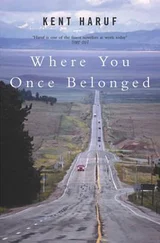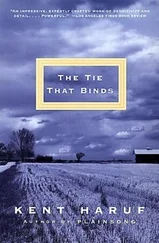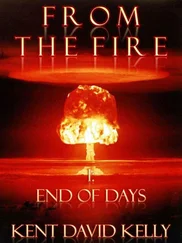Turn loose. I never meant nothing.
Yeah. You did.
I’m just saying what others have.
I’m not talking to no others.
Turn loose of me. What the hell’s a-wrong with you?
You mind me. Don’t you even think something like that again about her.
Then Raymond opened his hand and let go. The man stood up. You dumb old son of a bitch, he said. I was joking.
You got some of that right, Raymond said.
The man looked at him, then walked over and stood at the bar and spoke to the bartender and a second man standing there. They had seen what happened. He talked to them, rubbing his wrist, looking back at Raymond.
At the table Raymond finished his beer and got up and went outside to his pickup and drove home in the moonless late-winter night. When he was back inside the house again he walked into the girl’s bedroom and switched on the overhead light and stood looking at the old double bed with the quilt on it and the new crib against the wall with the new sheet stretched tight over it and the blanket folded down, all of it in readiness yet for the girl and the baby just as it had been before the girl had left that other morning and not come back. He stood looking around the room for some time. Thinking, remembering, considering different things here and there. Finally he switched the light off and went upstairs and paused in the hall. He stood in the open door to his brother’s bedroom. You awake? he said.
I am now, Harold said. I heard you come up the stairs. You must be flat perturbed about something, for the racket you was making. The room was dark, with just the light from the hall shining in. A pale square of window at the back wall gave out onto the yard and barn and corrals. Harold raised up in bed. What’s the matter? Something go wrong at the board meeting? Corn prices gone to hell?
No.
What then?
I went out for a drink afterward. At the Legion there with some of em.
Yeah? They haven’t made that a crime yet. What about it?
You know they’re talking, Raymond said.
Who is?
People in town. They’re talking about Victoria. About you and me with her. Saying things about the three of us.
So that’s what this is about, is it? Harold said. What did you expect would happen? Two old men take in a girl out here in the country, with nobody else around to look in on em. And the girl is young and good-looking even if she is pregnant, and the two old men that’s keeping her are still men even if they are about as old and dried up as some of this calcified horse shit. It’s going to happen. People are going to talk.
Maybe they are, Raymond said. He looked at his brother in the dark room with the window squared behind him. Only I don’t care for it, he said. They can keep their goddamn mouths off her. I don’t care for it even a little bit.
There isn’t a whole hell of a lot you can do about it.
Maybe not, Raymond said. He turned to cross the hallway to enter his own room, then he turned back. I might even come to understand that too, he said. But that don’t mean I got to like it. That don’t mean I’m ever going to get so I got to like it.
In the early morning they woke in the same bed at almost the same moment, with the stain already visible and distinct above the north windows across the room. Ike got up and began to dress. Then Bobby got up and dressed while his brother stood beneath the water stain, looking out the windows past the well-house toward the barn and fence and windmill. Beyond the fence Elko was doing something to himself. Look at that crazy son of a bitch, Ike said.
Who?
Elko.
Bobby looked at him.
Then he was dressed and they went downstairs where Guthrie was drinking black coffee and smoking cigarettes at the kitchen table, and as usual on a Sunday morning, reading something, a newspaper or magazine opened to the sunlight on the table. Passing through the kitchen they went down off the porch and on across the gravel in a hurry. They opened the gate and stepped into the corral. But the horse wasn’t dead then. He was still only kicking himself in the stomach. He was standing off by himself against the barn, away from Easter and the cats, and the sweat was dark along his neck and ribs and flanks. While they watched he dropped down into the dirt and rolled, his feet kicking into the air like a black bug or insect overturned and crawling its legs, his belly exposed while he rolled, lighter colored than the rest of him, brownish, and then he grunted and stood up again and swung his long black head back across his shoulder to look at his stomach. Immediately he began to kick at himself as if he were tormented by flies. But it wasn’t flies. They watched him for another minute, until he fell down onto the dirt again beside the barn, then they ran back to the house.
Guthrie was at the stove, stirring eggs. Wait, he said. Can’t one of you boys talk at a time?
They told him again.
All right, he said. I’ll go look. But you stay here. Eat your breakfast.
He went outside. They could hear his steps on the porch. When the screen door slapped shut they sat down at the bare wooden table against the wall and began to eat, sitting across from each other, chewing quietly and then listening and looking at each other and beginning to chew again, their brown heads and blue eyes almost identical above the crockery plates. When he finished eating, Ike stood up and looked out the window. He’s coming back, he said.
I guess he’s going to die, Bobby said.
Who is?
Your horse. I guess he’s going to die today.
No he isn’t. Eat your breakfast.
I already ate my breakfast.
Well eat some more.
Guthrie came back into the house. He crossed to the phone and called Dick Sherman. They talked briefly. Then he hung up and Ike said: What’s he going to do to him? He’s not going to hurt him, is he?
No. He’s already hurt.
But what makes him do that?
I’m not sure.
Was he still kicking himself?
Yes. There’s something the matter with him. Something in his stomach, I guess. Dick’ll look him over.
I guess he’s going to die, Bobby said.
You be quiet, Bobby.
He could die though.
But you don’t know that. You don’t know anything about it. So keep your mouth shut.
Stop now, Guthrie said.
The two boys looked at each other.
Both of you, he said. And you better go get your papers started. I heard the train half an hour ago. It’s time you were leaving.
Can’t we do it later?
No. People pay on time and they want their papers on time.
But just this once? Dick Sherman’ll be gone already.
He might be. And if he is I’ll tell you about it. Go ahead now.
You won’t let him hurt him.
No, I won’t let him hurt him. But Dick wouldn’t anyway.
Anyway, Bobby said. He’s hurt already.
They went back outside into that early morning cold sunlight for the second time and walked their bikes out of the yard. They looked toward the barn and corral. Elko was still humped on three legs, still kicking. They mounted the bikes and rode out of the driveway onto the loose gravel on Railroad Street and east a half mile to the Holt depot.
When they were finished with their paper route they met again at Main and Railroad and rode home. It was a little warmer now. It was about eight-thirty and they were sweating a little under the hair on their foreheads. They rode past the old light plant beside the tracks. When they passed Mrs. Frank’s house on Railroad Street and then the line of lilac bushes in her side yard, the new little heart-shaped leaves beginning to open along the branches now, they could see the extra pickup was still in the driveway at home, parked beside the corral.
Читать дальше







